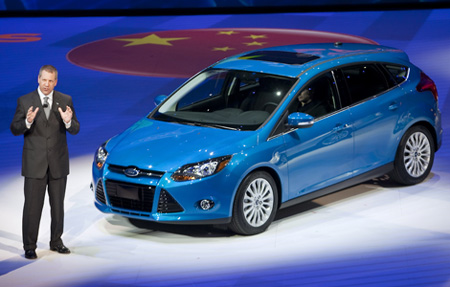China helps US automakers on the road to recovery
Updated: 2011-07-28 14:18
By Li Fangfang (China Daily)
|
|||||||||||
|
 |
|
Joe Hinrichs, chairman and chief executive officer of Ford China, speaks about vehicle sales in China during the North American International Auto Show (NAIAS) in Detroit, Michigan, in the United States in January. Ford is planning to bring 15 new models to the China market in the next five years.[Photo / Agencies] |
BEIJING - China's booming automobile market over the past two years has not only led it to overtake the United States as the world's biggest, it has also enabled US car makers to weather stagnant domestic sales caused by the financial crisis.
General Motors Corp, which recovered from bankruptcy protection in 2009 thanks, in part, to its prosperous business in China, has seen the country become its biggest market globally since 2010.
Last November, it became the first global automaker to sell 2 million vehicles in China in a single year.
In the first half, the US automaker continued its growth momentum with 1,273,502 vehicles delivered to the Chinese market, up 5.3 percent over last year.
Sales of Shanghai GM, its passenger-car joint venture with China's biggest auto conglomerate, SAIC Group, grew 25 percent year-on-year to 600,002 units.
"The sales data show that General Motors' passenger car venture in China is still reaping rewards for the US automaker, prompting it to strengthen its production capacity in the country," said Namrita Chow, senior analyst with consulting firm IHS Automotive.
Having already garnered rich results, and predicting even more from the China market, General Motors announced a five-year plan in April, saying that it will invest $5 to $7 billion over the next five years in its biggest vehicle market, aiming to double its sales to 5 million units by 2015.
The aggressive plan for continued success also includes introducing more than 60 new models and major product upgrades, with nearly half coming from its two mainstream brands, Buick and Chevrolet.
"To support our strong growth, we will expand our annual investment in China from the current $1 billion to at least $1.5 billion for every year to come, with a total investment of $5 to $7 billion in China's 12th Five-Year Plan (2011-2015) period," said Kevin Wale, president and managing director of General Motors China.
Another US automaker, Ford Motor Co, also reported positive sales in the first half as it seeks to significantly increase market share in China, aware of its increasing importance for the company's global growth.
"Ford is becoming aggressive in its plans but it still has to win market share from very strong players such as General Motors and Volkswagen in China," said Chow of IHS.
According to IHS, Ford wants to sell 8 million vehicles globally every year by 2015. By 2020 it expects 32 percent of its global sales to come from the Asia-Pacific region, more than double the current level.
"China will play an increasingly important role in Ford's global strategy," said Chow.
Chrysler Group LLC, the only "Big Three" US auto maker with no local production currently in China, is relying on surging local demand for sports-utility vehicles (SUVs) this year for good returns. It is importing new SUV models under its Jeep brand.
Although Chrysler only sold close to 9,000 imported vehicles in the first quarter, the 90 percent of year-on-year growth during the period indicates the company has started to recover its Chinese business.
It aims to increase its annual sales in China from last year's 23,428 to 40,000 units in 2011.
Zheng Jie, president of Chrysler China, said the company is going to introduce more SUV models in the coming years in an attempt to make Jeep the brand with the widest product line-up of SUVs in China.
The company also plans to add 50 dealerships in the next two to three years and double the number in the next five years.
China's passenger vehicle sales reported a favorable 5.3 percent year-on-year growth in the first half, as the market in June picked up after the sector experienced its first year-on-year sales drop in April since 2009.
The increase dismissed analysts' previous worries that the country would report the first negative year-on-year growth in the industry for the whole of 2011 and reinforced China's significance for global automakers.